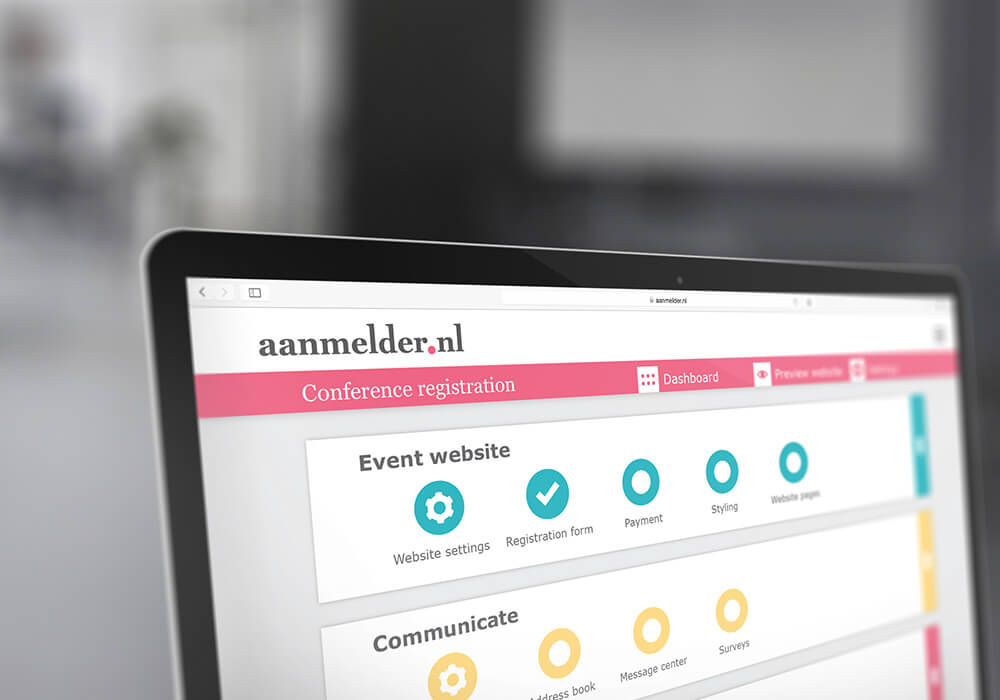Discover the latest updates for our Program Widget!
Discover the new Program Widget update in our Website Builder: enhanced color coding and parallel tracks for a clearer event overview!

What exactly is meant by an event? It refers to an organized gathering full of energy and vitality, aimed at bringing people together. Whether it's a small gathering or a large-scale spectacle, events share one common goal: to provide participants with an unforgettable experience. These can take place in various settings, whether indoors or outdoors, online or offline, or sometimes even a combination.
Events offer a variety of activities, such as presentations, performances, exhibitions, and workshops, which not only broaden the mind but also spark the imagination. For business events, the focus is often on sharing and exchanging knowledge – for instance, to develop innovative solutions for societal challenges.
It's worth noting that the events industry has changed significantly in recent years due to the emergence of new technologies. While offline events have always been popular, hybrid and online events have also gained traction. However, organizing these different types of events requires unique approaches and strategies to make them successful. In this blog, we’ll discuss the differences between these types of events and share practical tips for organizing each type successfully.
Offline events are gatherings that take place physically on-site, where participants are present in person. These can range from small-scale meetings, such as workshops and training sessions, to large-scale events, like festivals and conferences.
At offline events, there is direct, personal interaction between participants and speakers, which can foster deeper engagement and greater involvement from attendees. Additionally, offline events allow people to experience the atmosphere and dynamics of the location and the participants, contributing to a truly memorable experience.
Offline events offer several advantages over online events. The personal interaction and the ability to be truly present in a physical space can lead to a richer experience and more engagement among participants. Additionally, offline events often leave a stronger impression and create lasting memories.
Offline events also come with challenges. For instance, participant availability becomes a bigger factor as they need to be physically present at a specific location. Arranging elements such as the venue, catering, and possible accommodations can be complex and lead to higher costs. Additionally, offline events often have limited capacity, which can result in disappointment for participants who are unable to secure a spot.
Physical presence: Participants are physically present at the event, enabling personal interaction.
Location: A physical venue can enhance the experience of the event, but it may also be a drawback for participants as they may incur travel and accommodation costs to attend.
Limited capacity: Offline events often have limited capacity due to the constraints of physical space.
Less flexibility: Participants have less flexibility as they must be present at a specific location and time.
Participant registration: Make it easy for participants to sign up for your event with a user-friendly registration page. Collect important information such as names, email addresses, and payment details, and send automatic confirmation and reminder emails.
Ticketing: Simplify your ticketing process with aanmelder.nl's Event Management product. Sell tickets for your event securely and efficiently through our user-friendly system. We provide a secure online payment environment with support for multiple payment methods. Personalize your tickets with promotions and discount codes to attract participants.
Warm welcome: Offer participants a warm and professional welcome. With aanmelder.nl's Event Check-in system on-site, you ensure a quick and efficient start to the day. Participants can print their badges on-site using QR codes, and VIP guests can be welcomed personally. This avoids misspelled badges and unnecessary waste.
Communication: Keep participants informed with regular email updates and set up automated responses for inquiries and issues.
Financial administration: Manage payments and invoices directly from the dashboard. Set prices, review payment details, and export reports for simple accounting.
Dashboard management: View all key information in one clear dashboard. Track registration numbers, ticket sales, and financial status to monitor the progress of your event.

Online events are events that are organized entirely digitally, where participants are not physically present at a location. These events are streamed over the internet and can be viewed on a computer, tablet, or mobile phone. An online event can take various forms, such as a webinar, conference, presentation, or workshop. During the event, participants can communicate live with the speakers and other attendees through chat, Q&A sessions, and interactive polls.
Online events have some unique characteristics that set them apart from physical events. For instance, they can accommodate an unlimited number of participants and can be broadcasted worldwide. Additionally, online events are often more cost-efficient than physical events since there are no location or travel expenses involved.
Online events also come with various challenges. One of the biggest challenges is keeping participants engaged. Since attendees are not physically present, they can be more easily distracted by other things, such as emails, messages, or social media. That's why it's important to choose a platform that supports interaction through features like chat, Q&A, polls, and breakout rooms.
Another challenge can be the quality of participants' internet connections. This can result in poor audio quality, delays, or even disruptions during the presentation. Additionally, we've all experienced online events where the video quality and overall presentation failed to captivate the audience. Finally, the lack of personal contact and interaction between participants and speakers can hinder participant engagement and reduce the overall quality of the event.
Features of online events
Broader Reach: Online events can be attended globally and allow for far more participants compared to physical events.
Cost efficiency: Online events are often cheaper to organize as there are no venue or travel costs involved.
Flexibility: Participants can join the event from their own location and at a time that suits them best.
Interactivity: With the wide range of interactive tools available for online events, such as chat, Q&A, polls, and breakout rooms, participants and speakers can directly communicate and actively engage with the event.
3 Tips for successfully organizing an online event
Make use of interactive features: Opt for an event platform that offers interactive features to enhance the experience of your online event. Include features like one-on-one chat functionality, allowing participants to connect with each other, and live polling to keep the audience engaged. This boosts interaction among attendees and makes the event feel more personal.
Ensure a strong Q&A section: Make sure your event platform includes a Q&A section for each session. This allows participants to easily ask questions to the session moderator. Moderators can forward questions to other moderators and even make certain questions public for others to view. This opens up more opportunities for interaction between participants and moderators.
Choose reliable technology: Select dependable and user-friendly technology. This is crucial for successfully hosting an online event. The event platform from aanmelder.nl provides reliable technology, along with handy interactive features, to help make your event a success.

Hybrid events
Hybrid events combine both physical (offline) and virtual (online) elements. Participants can attend either in person or online, and the event can take place at a single location or across multiple locations simultaneously.
A hybrid event combines the advantages of a physical event—such as personal interaction and networking opportunities—with the benefits of an online event, like broader reach and accessibility.
Hybrid events have grown in popularity over the last few years because they allow organizers to reach a larger audience. Those unable to attend in person can still participate from the comfort of their home or office. This provides greater flexibility and choice for both organizers and participants.
Hybrid events also come with a set of challenges. Firstly, they require more effort since you’re essentially organizing two events—one online and one offline. While some might assume that hybrid events are cheaper than offline events, that’s often not the case. To make the event accessible both online and offline, you’ll need additional provisions like livestreaming and a physical venue, which can drive up costs.
Another challenge is dealing with the required equipment. Making networking effective and engaging both online and offline can be tricky. It's important to consider these challenges when planning a hybrid event.
Ensure clear communication with participants: It’s essential to communicate clear instructions to participants so they know what to expect. This can be done through email or other communication channels. Make sure the login process is straightforward and privacy settings are properly configured.
Use reliable technology: A stable internet connection is critical for a successful livestream. Opt for a wired connection instead of WiFi and have a backup network in place. Consider using a professional livestream service like Event Streaming, which guarantees high-quality video and audio for viewers. Bonus tip: Event Streaming includes a built-in router for a stable connection.
Test Equipment and software in advance: Thoroughly test all equipment and software before the livestream begins. This includes cameras, microphones, tripods, lighting, computers, and the internet connection. A trial setup can help identify and fix any issues beforehand. Additionally, create a detailed script or schedule for the livestream and ensure all team members understand their roles.
By addressing these aspects, hybrid events can successfully blend the best of both online and offline experiences.
Planning an event Soon? With event management, you can automate and streamline various tasks, allowing you to focus on the event itself. Automate, personalize, and brand your mailings, create an event website, register attendees, sell tickets, manage financial administration, and much more—all from one user-friendly dashboard.
Discover the new Program Widget update in our Website Builder: enhanced color coding and parallel tracks for a clearer event overview!
Discover the ultimate tool for event organizers - the Program Widget. Easily create, update, and personalize your event program for a seamless...
Easily organize multilingual events. Create and edit translations directly in the Website Builder for a seamless international experience.